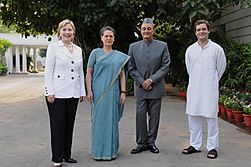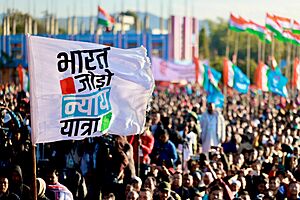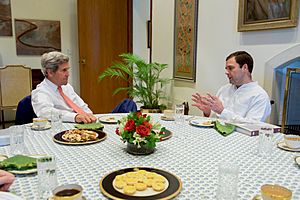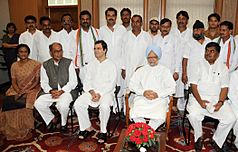Rahul Gandhi facts for kids
Quick facts for kids
Rahul Gandhi
|
|||||||||||||||||||||||||||||||||||||||||||||
|---|---|---|---|---|---|---|---|---|---|---|---|---|---|---|---|---|---|---|---|---|---|---|---|---|---|---|---|---|---|---|---|---|---|---|---|---|---|---|---|---|---|---|---|---|---|
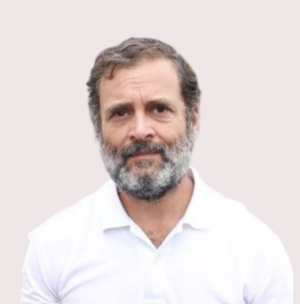
Gandhi in 2024
|
|||||||||||||||||||||||||||||||||||||||||||||
| Leader of the Opposition in Lok Sabha | |||||||||||||||||||||||||||||||||||||||||||||
| Assumed office 9 June 2024 |
|||||||||||||||||||||||||||||||||||||||||||||
| Prime Minister | Narendra Modi | ||||||||||||||||||||||||||||||||||||||||||||
| Preceded by | Sushma Swaraj (2014) | ||||||||||||||||||||||||||||||||||||||||||||
| Member of Parliament, Lok Sabha | |||||||||||||||||||||||||||||||||||||||||||||
| Assumed office 4 June 2024 |
|||||||||||||||||||||||||||||||||||||||||||||
| Preceded by | Sonia Gandhi | ||||||||||||||||||||||||||||||||||||||||||||
| Constituency | Rae Bareli, Uttar Pradesh | ||||||||||||||||||||||||||||||||||||||||||||
| In office 7 August 2023 – 17 June 2024 23 May 2019 – 23 March 2023 |
|||||||||||||||||||||||||||||||||||||||||||||
| Preceded by | M. I. Shanavas | ||||||||||||||||||||||||||||||||||||||||||||
| Succeeded by | Priyanka Gandhi Vadra | ||||||||||||||||||||||||||||||||||||||||||||
| Constituency | Wayanad, Kerala | ||||||||||||||||||||||||||||||||||||||||||||
| In office 17 May 2004 – 23 May 2019 |
|||||||||||||||||||||||||||||||||||||||||||||
| Preceded by | Sonia Gandhi | ||||||||||||||||||||||||||||||||||||||||||||
| Succeeded by | Smriti Irani | ||||||||||||||||||||||||||||||||||||||||||||
| Constituency | Amethi, Uttar Pradesh | ||||||||||||||||||||||||||||||||||||||||||||
|
|||||||||||||||||||||||||||||||||||||||||||||
| Personal details | |||||||||||||||||||||||||||||||||||||||||||||
| Born |
Rahul Rajiv Gandhi
19 June 1970 New Delhi, Delhi, India |
||||||||||||||||||||||||||||||||||||||||||||
| Political party | Indian National Congress | ||||||||||||||||||||||||||||||||||||||||||||
| Parents | Rajiv Gandhi (father) Sonia Gandhi (mother) |
||||||||||||||||||||||||||||||||||||||||||||
| Relatives | Priyanka Gandhi Vadra (sister) Nehru–Gandhi family |
||||||||||||||||||||||||||||||||||||||||||||
| Residence | 10, Janpath, New Delhi | ||||||||||||||||||||||||||||||||||||||||||||
| Alma mater | Rollins College (B.A.) Trinity College, Cambridge (M. Phil. Development Studies) |
||||||||||||||||||||||||||||||||||||||||||||
| Signature | |||||||||||||||||||||||||||||||||||||||||||||
Rahul Rajiv Gandhi (born 19 June 1970) is an important Indian politician. He is a member of the Indian National Congress (INC) party. As of July 2025, he is the 12th Leader of the Opposition in Lok Sabha. This means he leads the main opposition party in India's Parliament. He is also a Member of Parliament (MP) for Rae Bareli in Uttar Pradesh, a position he has held since June 2024.
Before this, he was an MP for Wayanad, Kerala, from 2019 to 2024. He also represented Amethi, Uttar Pradesh, from 2004 to 2019. From December 2017 to July 2019, Rahul Gandhi served as the President of the Indian National Congress party.
Rahul Gandhi comes from the famous Nehru–Gandhi political family. He spent his early years in Delhi and Dehradun, mostly away from public attention. He went to school in New Delhi and then The Doon School. However, for safety reasons, he was later taught at home. He started college at St. Stephen's College before moving to Harvard University. After his father's assassination, he moved to Rollins College in Florida, finishing his degree in 1994. He then earned a Master's degree from Cambridge. After his studies, Gandhi worked for a management consulting firm in London. He later returned to India and started a technology company in Mumbai. In the 2000s, he entered politics. He led the Indian Youth Congress and the National Students Union of India. He also became a trustee for the Rajiv Gandhi Foundation and Rajiv Gandhi Charitable Trust.
Rahul Gandhi led the Congress party in the 2014 and 2019 general elections. In these elections, the party did not win many seats. Before the 2024 Indian general elections, Gandhi led two long marches across India: the Bharat Jodo Yatra and the Bharat Jodo Nyay Yatra. These marches helped the INC win more seats in 2024, becoming the Official Opposition again after ten years. In the 2024 elections, Gandhi won the Rae Bareli Lok Sabha constituency seat. He was then chosen to be the Leader of the Opposition.
Contents
Early Life and Family Background
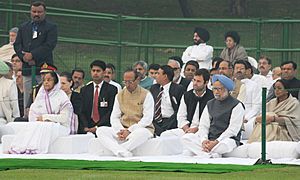
Rahul Gandhi was born on 19 June 1970 in Delhi. He was the first of two children of Rajiv Gandhi and Sonia Gandhi. His father, Rajiv Gandhi, later became the 6th Prime Minister of India. His mother, Sonia Gandhi, became the president of the Indian National Congress. Rahul Gandhi is the grandson of former Prime Minister Indira Gandhi. His great-grandfather was Jawaharlal Nehru, India's first Prime Minister. This means his family has a long history in Indian politics.
He went to St. Columba's School in New Delhi for his early education. From 1981 to 1983, he attended The Doon School in Dehradun. This was the same boarding school his father, Rajiv Gandhi, attended. After his grandmother, Indira Gandhi, was assassinated in 1984, his father became Prime Minister. Due to safety concerns from extremists, Rahul and his sister, Priyanka, were taught at home. They mostly stayed out of the media spotlight during their childhood.
In 1989, Gandhi started his college education at St. Stephen's College in Delhi. He studied History. He was admitted through a special sports quota because he was a good shooter. He had won several national awards in shooting. In 1991, after his father, Rajiv Gandhi, was assassinated, Rahul left St. Stephen's. He moved to Harvard University and then to Rollins College in Florida for security reasons. He finished his Bachelor's degree in 1994. In 1995, he earned a Master's degree in Development Studies from Trinity College, Cambridge.
After finishing his studies, Gandhi worked for a management consulting firm in London for three years. In 2002, he returned to India. He started his own technology consulting company, Backops Services Private Ltd, in Mumbai. He was one of the directors of this company. He also founded BackOps UK, which worked on defense contracts.
Political Journey
Starting in Politics
In March 2004, Rahul Gandhi announced he would enter politics. He decided to run for election from Amethi in Uttar Pradesh. This was his father's old constituency. His mother, Sonia Gandhi, had held the seat but moved to a nearby area. Many people were surprised by his decision. They thought his sister, Priyanka, might enter politics first. People hoped that a young member of the famous political family would bring new energy to the Congress party. In his first interview with foreign media, Gandhi said he wanted to unite the country. He spoke against "divisive" politics and aimed to reduce tensions between different castes and religions.
The Congress party won the 2004 general elections and formed a government. Rahul Gandhi won his seat by a large number of votes. He kept his family's strong hold in Uttar Pradesh. He did not hold any official government position at first. From 2004 to 2006, he was part of the Standing Committee on Home Affairs. From 2006 to 2009, he was on the Standing Committee for Human Resource Development.
In 2006, Rahul and his sister, Priyanka, helped their mother campaign for re-election in Raebareilly. She won by a huge margin. In 2007, Rahul was a key figure in the Congress campaign for the 2007 Uttar Pradesh Legislative Assembly election. On 24 September 2007, he was made the general secretary of the All India Congress Committee. This is the main governing body of the Congress party. He was also put in charge of the Indian Youth Congress and the National Students Union of India.
For the 2009 Indian general election, Gandhi traveled across India. He visited 22 states and 107 areas. He gave speeches, met voters, and talked about the party's plans for the country. He focused on issues like rural development, education, jobs, and women's empowerment. He also encouraged young people to get involved in politics. The Congress-led government won the elections, which surprised many. The INC won 206 seats. Rahul Gandhi won his Amethi seat again by a large margin. He was given credit for helping the Congress party do well in Uttar Pradesh, where they won 21 out of 80 seats.
Youth Leadership
In September 2007, Rahul Gandhi became the general secretary of the Indian Youth Congress (IYC) and the National Students Union of India (NSUI). The IYC represents young people in the Congress party, and the NSUI focuses on students. After he took charge, both groups grew a lot. Membership increased from 200,000 to 2.5 million. The IYC was changed to be more democratic and open. In November 2008, Gandhi personally interviewed people to form a special group for the IYC. In 2009, during his visit to West Bengal, the Youth Congress in that state gained 1 million members. In Uttar Pradesh, the number of new members in the IYC also increased significantly after his visit.
As general secretary of the NSUI, Gandhi worked to make the organization stronger. He encouraged more students to participate in politics. Under his leadership, the NSUI started programs to help students with education, jobs, and social justice. Gandhi also supported greater student involvement in decision-making.
Leading the Congress Party
Before the 2014 Indian general election, Rahul Gandhi was named the vice president of the Indian National Congress. This made him the second-in-command of the party. He ran for election from his Amethi constituency and led the Congress party's campaign. He won his Amethi seat again, defeating Smriti Irani of the BJP. However, the Congress party lost badly in the 2014 elections, winning only 44 seats. This was their worst performance ever. After the defeat, Gandhi offered to resign, but the party leaders refused.
Rahul Gandhi led the 2019 election campaign for the Congress party. During his campaign, he announced the "Nyay" (Minimum Income Guarantee) Scheme. This plan promised Rs 6,000 to the poorest households. He also promised to create 2.2 million government jobs within one year if his party came to power. Gandhi used the slogan "Chowkidar Chor Hai" (The Watchman is a Thief) against Narendra Modi. This slogan was about alleged problems in a fighter jet deal. After the election results, the INC won 52 seats, which was a small improvement. However, their vote percentage was still low. Gandhi won the Wayanad seat with over 60 percent of the votes. But he lost his Amethi seat to Smriti Irani.
Before the 2024 Indian general elections, Rahul Gandhi led two major political initiatives. These were the Bharat Jodo Yatra and the Bharat Jodo Nyay Yatra. These campaigns aimed to bring people together and address important social and economic issues. They also helped the Indian National Congress (INC) become more visible to voters. The INC won 99 seats in the 2024 elections. This was an improvement from previous elections. It allowed the party to become the Official Opposition again after ten years. In the elections, Gandhi won the Rae Bareli seat, taking over from his mother, Sonia Gandhi. After this victory, he was chosen as the Leader of the Opposition in Parliament. This strengthened his role in the party and the opposition.
Since becoming a Member of Parliament in 2004, Rahul Gandhi has served on several parliamentary committees. These include committees on Home Affairs, Human Resource Development, External Affairs, Finance and Corporate Affairs, and Defence.
Temporary Disqualification from Parliament
On 13 April 2019, during a political rally in Kolar, Karnataka, Rahul Gandhi made a comment about people with the surname Modi. A politician from the Bharatiya Janata Party (BJP) named Purnesh Modi filed a court case against him. He claimed that Gandhi had insulted everyone with the Modi surname. On 23 March 2023, a court found Rahul Gandhi guilty of defamation and sentenced him to two years in prison.
The day after the conviction, Rahul Gandhi was removed from his position as a Member of Parliament for the Wayanad area. This action was taken under a law that deals with convicted representatives in India. Gandhi's lawyer appealed the decision in a higher court. On 5 August 2023, the Supreme Court of India paused his conviction and sentence. This meant his disqualification was put on hold.
Rahul Gandhi's temporary removal from Parliament caused many reactions. The Congress party and other opposition leaders spoke out against it. Some legal experts questioned the basis of the charge. International lawmakers also commented on the situation. For example, a US Congressman called it a "deep betrayal" of India's values. Germany's foreign ministry said they were watching the situation. A US Senator also called the news "alarming."
Bharat Jodo Yatra
The Bharat Jodo Yatra, which means "Unite India March," was a campaign organized by the Congress party from 2022 to 2023. Its main goal was to promote national unity and togetherness across India. It aimed to gather support for the INC and its ideas, focusing on themes like patriotism and development. Rahul Gandhi started the march on 7 September 2022 in Kanyakumari. He paid respects to his father, Rajiv Gandhi, and other important figures. During the yatra, Gandhi and other INC leaders traveled across the country. They held rallies, public meetings, and talked with people. Gandhi focused on issues like economic development, social justice, and fair governance. He wanted to strengthen the party's presence at the local level and make it more important nationally.
The yatra ended on 29 January 2023, when the tricolour flag was unfurled in Lal Chowk, Srinagar. It lasted 137 days and covered 4,080 kilometers (2,540 miles) over almost five months. It passed through 12 states and two union territories. During the yatra, the INC elected a new party president. The party also won a majority in the 2022 Himachal Pradesh Legislative Assembly election. In the elections in Karnataka and Telangana in 2023, the Congress party won by a large margin. They gained more votes and seats in the areas where the march had passed.
Bharat Jodo Nyay Yatra
From 14 January to 20 March 2024, Rahul Gandhi led a second yatra across India, from east to west. This was called the Bharat Jodo Nyay Yatra. Unlike the first march, this one was done in a mix of ways, including travel by vehicle.
Political Views
National Security
In December 2010, some secret US diplomatic messages were leaked by WikiLeaks. One message from August 2009 mentioned a conversation between Rahul Gandhi and the US ambassador to India. In this talk, Gandhi said he believed that Hindu extremists were a bigger threat to India than Muslim militants. He specifically mentioned certain figures in the Bharatiya Janata Party (BJP). He also said there was some evidence that certain groups in India's Muslim population supported the militant group Lashkar-e-Taiba (LeT). The BJP strongly criticized Gandhi for these statements. They said his words could divide the country and harm India's fight against terror. Gandhi has also criticized groups like the RSS, comparing them to terrorist organizations.
After the 2013 Muzaffarnagar riots, at a rally in Indore, Gandhi claimed that a police officer told him that Pakistan's intelligence service, ISI, was trying to recruit young people affected by the riots. Government officials and intelligence agencies denied this. This comment drew strong criticism from various political parties. The ECI asked Gandhi to explain his remarks. Gandhi replied that he did not mean to cause communal tension but was talking about divisive politics.
Lokpal Bill
Rahul Gandhi believes that the Lokpal (an anti-corruption body) should be made a constitutional body. He thinks it should be accountable to the Parliament, just like the Election Commission of India. He has said that the Lokpal alone cannot end corruption. Instead, a strong political will is needed to remove corruption. He made this statement on 25 August 2011, during a protest by Anna Hazare. Opposition leaders criticized Gandhi's statement, calling it a tactic to delay things. However, a parliamentary committee later recommended that the Lokpal be made a constitutional body.
Farmers and Land Issues
On 19 April 2015, Rahul Gandhi spoke at a rally for farmers and workers in Ramlila Maidan. He talked about his protests in Niyamgiri in Orissa and Bhatta-Parsaul in Uttar Pradesh. About 100,000 people attended the rally. In his speech, he criticized Prime Minister Narendra Modi. He said Modi borrowed money from rich business people for his campaigns. Gandhi claimed Modi would pay them back by giving them farmers' land.
He called the government a "suit-boot government," referring to a fancy suit Modi wore. He also used the phrase "acche din government" (good days government), which was Modi's election slogan. Gandhi said this government had "failed the country."
In May 2015, the BJP government introduced a land bill in Parliament. Opposition parties criticized it. Rahul Gandhi accused the government of "murdering" the previous government's land bill. He promised to stop the bill from passing, either in Parliament or through street protests. He said the bill was "anti-farmer." On 26 May, the Modi government's first anniversary, Gandhi said that the celebrations were only for a few powerful friends of the government. He added that farmers and workers had nothing to celebrate.
Women's Empowerment and LGBTQ Rights
Rahul Gandhi has often spoken about the importance of women's empowerment and gender equality in India. He has said that the Congress party would actively promote women in its organization. He set a goal to have 50 percent of chief ministers be women within the next 10 years. Gandhi started Self-Help Groups for women in villages in Amethi. These groups aimed to bring women together and give them more information and decision-making power. He has called for more women in politics and an end to violence against women.
Under the second Manmohan Singh ministry, a Women's Reservation Bill was introduced. This bill would reserve one-third of seats in Parliament and state assemblies for women. Gandhi supported this bill. He said, "Women do not need any protection. If you give them their rights, they can protect themselves." The bill passed in one house of Parliament in 2010 but did not become law. In 2019, Gandhi again called for 33 percent reservation for women in Parliament, state assemblies, and government jobs.
On 6 September 2018, the Supreme Court of India changed a law that made homosexual acts illegal. Rahul Gandhi supported this change. He said that issues about personal freedom should be left to individuals. He believes it is important to protect the rights of all citizens in India. Under Gandhi's leadership, the Congress party appointed a transgender woman as a national general secretary in its women’s wing. This was seen as a step towards including transgender people more in mainstream society.
Climate and Energy
Rahul Gandhi supports moving to renewable energy sources. He has called for more investment in solar, wind, and other sustainable energy technologies. He is very concerned about environmental degradation (damage to the environment). He has said that environmental problems will not get enough attention unless they become a political issue.
Gandhi criticized a draft environmental assessment plan from 2020. He called it "dangerous" and said its long-term effects would be harmful. He said it would silence communities directly affected by environmental damage.
Economy

Rahul Gandhi has said that the economic policies of the Modi Government mainly benefit a few very rich business people. He calls them "crony capitalists" and "best friends of Modi." He has criticized the government for selling off government-owned companies. He believes that the RSS and these rich business people are working together to control India. He has been especially critical of Indian billionaire Gautam Adani, saying the Modi Government has been very favorable to him. He sees Adani's rise as a result of crony capitalism. Gandhi says he is not against business but supports fairness. He disagrees with selling off government companies and says the Congress party will not allow it if they come to power. Citing a report on inequality, he said that rising economic inequality is a result of the Modi Government's economic policies.
Demonetisation
Rahul Gandhi has strongly criticized the Modi government's demonetisation of ₹500 and ₹1,000 banknotes. He has called it a "tragedy" and a "disaster" that hurt the Indian economy and ordinary people. Gandhi has accused the government of doing this without enough planning. He says it caused great hardship to poor and vulnerable people. He believes demonetisation was a major policy failure. He has also claimed it was a deliberate move to help a few rich business people control the economy. He called demonetisation the country's "biggest scam."
In his speeches and rallies, Gandhi has consistently criticized demonetisation. He claims it failed to achieve its goals of fighting black money and corruption. He has also argued that the policy was put in place without proper discussions with experts or opposition parties. Gandhi has said that demonetisation caused major problems for farmers. It also led to millions losing their jobs in small and medium-sized businesses and in the informal sector.
Electoral History
| Year | Constituency | Party | Votes | % | Result | |
|---|---|---|---|---|---|---|
| 2004 | Amethi | Indian National Congress | 390,179 | 66.18% | Won | |
| 2009 | 464,195 | 71.78% | Won | |||
| 2014 | 408,651 | 46.71% | Won | |||
| 2019 | 413,394 | 43.86% | Lost | |||
| Wayanad | 706,367 | 64.67% | Won | |||
| 2024 | 647,445 | 59.69% | Won | |||
| Rae Bareli | 687,649 | 66.17% | Won | |||
Positions Held
Public Offices
In 2004, Rahul Gandhi was elected to the 14th Lok Sabha. He served on the Standing Committee on Home Affairs from 2004 to 2006. He was also a member of the Standing Committee on Human Resource Development from 2006 to 2009. In 2009, he was re-elected to the 15th Lok Sabha for his second term. He continued to be a member of the Standing Committee on Human Resource Development. He also joined the Consultative Committee on Rural Development.
In 2014, Gandhi was elected to the 16th Lok Sabha for his third term. He served on the Standing Committee on External Affairs. He was also a member of the Consultative Committee on the Ministry of Finance and Corporate Affairs. In 2019, he was elected to the 17th Lok Sabha for his fourth term. He served on the Standing Committee on Defence. He was also a member of the Consultative Committee for the Ministry of External Affairs.
In 2024, Gandhi was elected to the 18th Lok Sabha for his fifth term. He became the 12th Leader of the Opposition in Lok Sabha. He also serves as a member of the Standing Committee on Defence.
| Year | Description |
|---|---|
| 2004 | Elected to 14th Lok Sabha
|
| 2009 | Elected to 15th Lok Sabha (2nd term)
|
| 2014 | Elected to 16th Lok Sabha (3rd term)
|
| 2019 | Elected to 17th Lok Sabha (4th term)
|
| 2024 | Elected to 18th Lok Sabha (5th term)
|
Within the Party
Between 2008 and 2013, Rahul Gandhi was the general secretary of the Indian National Congress (INC). Since 2007, he has been the chairperson of both the Indian Youth Congress and the National Students' Union of India (NSUI). He helped establish these positions and continues to hold them. He was the vice-president of the INC from 2013 until 2016, when the position was removed. Later, from 2017 to 2019, Gandhi served as the president of the INC, taking over from Sonia Gandhi.
| Year | Position | Preceded by | Succeeded by |
|---|---|---|---|
| 2008–2013 | General secretary of INC | N/A | N/A |
| 2007–Incumbent (as of 2020) | Chairperson of Indian Youth Congress | Position established | Incumbent |
| 2007–2020 | Chairperson of NSUI | Position established | Mallikarjun Kharge |
| 2013–2016 | Vice president of INC | Position established | Position abolished |
| 2017–2019 | President of INC | Sonia Gandhi | Sonia Gandhi (interim) |
See also
 In Spanish: Rahul Gandhi para niños
In Spanish: Rahul Gandhi para niños
- Indian National Developmental Inclusive Alliance
- National Students' Union of India
- Indian Youth Congress
- List of presidents of the Indian National Congress


